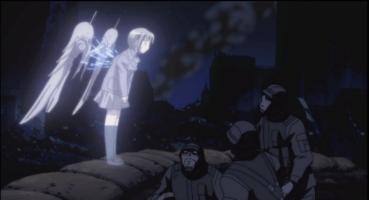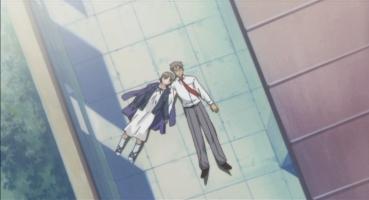|
I feel I've made all of my most pertinent comments on She's sound and visual effects in my review for Volume 1; if you have yet to read it, that review goes into more detail about the background to the story and the characters.
Volume 2 of She, The Ultimate Weapon (the original Japanese name was "Saishu Heiki Kanojo", shortened to Saikano) is released 31st July by Manga Entertainment. The first volume put forth a lot of interesting questions, but barely had the time to answer them in the four episodes present. While Volume 2 valiantly attempts to plough through the pre-existing plotlines, it introduces yet more problems and questions for its central pairing of lovestruck teenagers, Shuji and Chise.

In a nutshell: Chise and Shinji fall in love, but this is slightly marred by Chise being taken away by government scientists and turned into a living weapon, being made to fight Japan's enemy in a brutal and seemingly neverending war. Volume 1's focus was strictly on the romance between Shuji and Chise, only beginning to introduce peripheral characters – the military forces, an ex-girlfriend of Shuji's – in the last two episodes of the disc. Volume 2 takes the relationship in a slightly different direction: for the first two episodes, events continue as they had previously, with the hard question being "Can their love survive when one of them is being forced to destroy cities?".
But in the middle of episode 7, the story diverts its focus away from the couple, as they find themselves forced apart by circumstance – Shuji ponders as to whether he'll ever get used to Chise not being around, and Chise – who, by this point, is emotionally distraught over what's happened to her – finds herself growing closer to Tetsu, the husband of Shuji's ex-girlfriend. It all forms a rather maudlin, detatched love triangle. It is in this volume that She stops asking "Can their love survive?" and starts seriously commenting on the stark truths of war – the school-age constantly talk of death, and the soldiers portrayed in the latter two episodes seem completely resigned to the fact that they're probably going to die.
The middle act of She comprises four episodes, 5-8 of 13:
5: "Liar"
Shuji feels that he must talk to Chise about his affair with Fuyumi. Understandably, she doesn't take the news well, and decides that they should go back to being "just classmates".
6: "Classmates"
Shuji and Chise, now "classmates" again, try to get on with their lives without each other – but when Chise accidentally destroys half the school, Shuji realises that he really loves and cares for her, and can't simply let her leave.
7: "What I Want to Protect"
Shuji's best friend, Otsushi, enlists in the military and goes off to fight. Shuji tries to continue his relationship with Chise, but Chise herself becomes emotionally unbalanced and cannot face going back to how things were. She decides never to go back to school again.
8: "Everyone's Changing"
Chise begins to connect with Tetsu, the ex-leader of her commando unit, and husband of Fuyumi. Bitter because of the loss of so many of his men, Tetsu finds himself wanting to protect and comfort Chise.

I'm very interested to learn the truth behind the experiments performed on Chise. In Volume 1, I believed that the situation was roughly analogous to Gunslinger Girl – in that series, the young girls are chosen to be trained as assassins because nobody would expect a child to be a killer. Chise has no such excuse – since nobody can stand up to her, having a "secret identity" such as this is pointless. All of the military seem to know her anyway (and, worryingly, seem perfectly happy with the idea of a schoolgirl being used in this way). This begs the question – why was Chise chosen in the first place? Surely if the government wanted to perform experiments of this kind, they'd use adult test subjets who are mentally stable and aware of everything. I doubt that Chise's idea that she is being punished for something is correct, but I would hate to see the series end without resolving this plot point. As the series is taken from a manga, this is a distinct possibility – often, animé versions of mangas cut short the original story, omitting certain plot points to save time.
The
third and final volume of She is released in about
three weeks' time. I'm looking forward to seeing just how
many of these hanging plot threads are resolved by the end
of the series, which has proved thus far to be thought-provoking,
emotive and occasionally – when the characters are allowed
to forget their agonising situation – very sweet.
As
with volume 1, the picture is good but not great, the main
culprit being the lack of anamorphic enhancement on the
16:9 widescreen picture. The very slightly washed out look
could well be an deliberate artistic choice.
Japanese
and English voice tracks are available in both stereo 2.0
and 5.1 surround. The 5.1 is the clearer, but the mix is
a little random, sometimes placing sounds inappropriately
at the rear. A DTS track is available on disc 2, and is
similar to the 5.1 track, just slightly louder.
Volume
2's extra features are comparable to those of volume 1.
There's an interesting interview with the voices of Fuyumi and Tetsu, although it appears
to have been made for the first volume instead of the second
(they talk about episodes 2-4). The title of the interview
is "The Adult's Saikano" – as Fuyumi and Tetsu are the main
featured adults in the series, the pair discuss how Saikano
can be seen both as a teenage love story and as a deeper,
adult romance.
Also
included is some production art, which is
nice, but a little pointless if you're not into the artistic
side of anime. The usual trailers are present, this time
for Robotech and Heat Guy J.
|